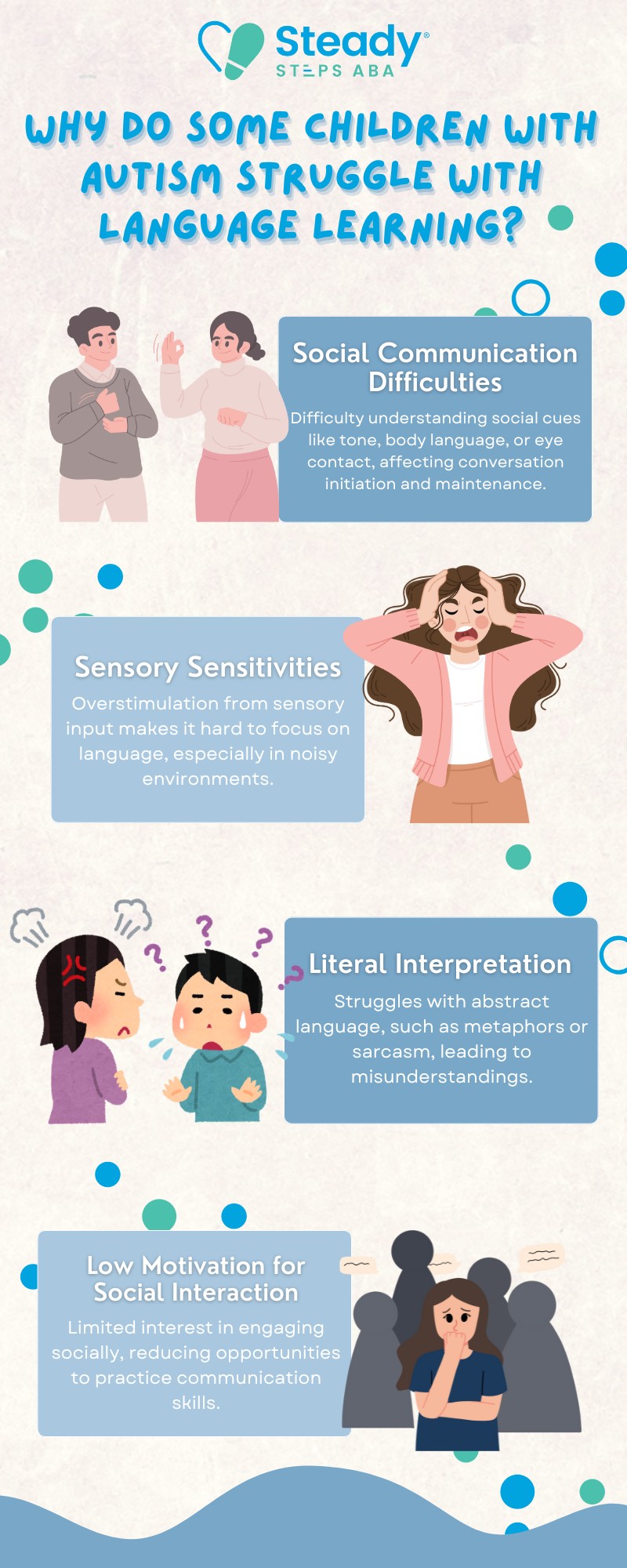Key Points:
- Autism can delay or disrupt language acquisition in children, affecting both verbal and non-verbal communication.
- Children with autism may have unique strengths in language learning but face challenges in social communication, understanding abstract concepts, and adapting to new contexts.
- ABA therapy can be highly effective in supporting language development for children with autism.
One of the most noticeable areas impacted by Autism Spectrum Disorder (ASD) is language development. From difficulty with articulation to challenges in social communication, children with autism often struggle with learning language in typical ways. In this article, we’ll dive into how autism affects language learning, explain some of the common language-related challenges children with autism face, and explore strategies that can help improve communication skills.
How Does Autism Affect Language Learning?
Autism can affect language learning in various ways, leading to delays, difficulties with verbal communication, and challenges in understanding social cues. Each child with autism is unique, so language challenges can vary significantly from one child to another. However, there are some common patterns that many children with autism share when it comes to language learning.
For many children with autism, speech development may be delayed, meaning they might start talking later than their peers. They may also have difficulty understanding the nuances of language, such as idioms or jokes. Non-verbal communication, including body language and facial expressions, can also be challenging.
In some cases, children with autism may exhibit advanced language skills in certain areas, such as rote memorization, but struggle with spontaneous language use or conversations. This is particularly true for those who have what is referred to as “high-functioning autism” or Asperger’s Syndrome.
Several factors can explain why autism language learning tends to be different or more challenging for children with autism. Let’s take a closer look at the most significant ones.

What Are Some Common Language Challenges for Children with Autism?
Children with autism may experience a range of language-related challenges. These challenges can manifest in many different forms and vary in severity, but here are some of the most common issues:
- Delayed Speech Development
Many children with autism experience delays in speech development. This could mean that a child may not begin speaking until much later than their peers or may have difficulty forming clear words or sentences. - Echolalia
Echolalia is the repetition of words or phrases, and it is common among children with autism. Some children may echo what they hear without fully understanding the meaning. This can affect communication because it can prevent the child from using language in an original or functional way. - Limited Vocabulary
Children with autism often have a limited vocabulary compared to their peers. They may also struggle to form more complex sentences or use advanced grammar, limiting their ability to express themselves. - Pragmatic Language Issues
Pragmatics refers to the social use of language. Children with autism may have difficulty understanding the rules of conversation, such as taking turns speaking, staying on topic, or using appropriate greetings. - Non-Verbal Communication
Some children with autism may avoid or struggle with non-verbal communication, such as gestures, facial expressions, or eye contact. This can make it more challenging to understand what they want to communicate.

How Can Parents Help Children with Autism Improve Language Skills?
While the challenges of autism language learning can feel overwhelming, there are many effective strategies that can help children with autism improve their language skills. Here are a few practical tips:
- Create a Structured Routine
Children with autism thrive in structured environments. By having a predictable daily routine, parents can help their child feel more comfortable and make learning language more consistent. - Use Visual Aids
Visual aids such as pictures, flashcards, or written words can be incredibly helpful for children with autism. These tools can help them connect words with meanings and reinforce language learning in a visual, concrete way. - Encourage Social Interaction
Even if your child seems uninterested in socializing, try to encourage opportunities for interaction with others. Structured playdates or social groups with other children with autism can offer a low-pressure way to practice language skills. - Focus on Functional Communication
Teach your child how to use language for practical purposes, such as requesting items, expressing emotions, or participating in conversations. Emphasizing functional communication makes language use more meaningful and motivating. - Use ABA Therapy
ABA therapy (Applied Behavior Analysis) is an evidence-based approach that is highly effective in teaching language skills to children with autism. ABA focuses on breaking down language tasks into smaller steps and using reinforcement to encourage progress.
How ABA Therapy Can Help with Autism Language Learning
ABA therapy is one of the most effective therapies for supporting children with autism in developing language and communication skills. ABA focuses on reinforcing positive behavior and teaching skills through repetition and clear, structured tasks.
In the context of language development, ABA therapy might involve:
- Modeling appropriate language: Therapists model the correct way to use language in specific situations, and children are encouraged to repeat or imitate.
- Using reinforcement: Positive reinforcement is used to reward the child for using language in a functional way, which motivates them to continue practicing.
- Building social communication skills: ABA helps children practice social interactions in a controlled environment, allowing them to learn the rules of conversation, such as taking turns or asking for help.
Get Support for Your Child’s Language Development with Steady Steps ABA
Grasping how language learning works for children with autism is crucial in fostering their communication abilities. Although many children with autism encounter difficulties with language, there are various strategies to help them thrive.
If you’re seeking expert assistance, Steady Steps ABA provides customized ABA therapy services designed to help children with autism improve their language and communication skills. Our skilled team of therapists collaborates with families to create individualized plans that cater to each child’s unique needs and strengths.
Based in Maryland, Steady Steps ABA is committed to offering the necessary support for your child’s growth in language development. Contact us today to discover how we can enhance your child’s communication through our personalized ABA therapy!






